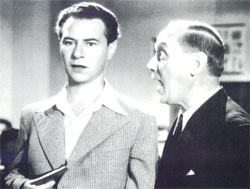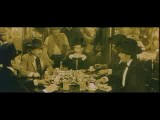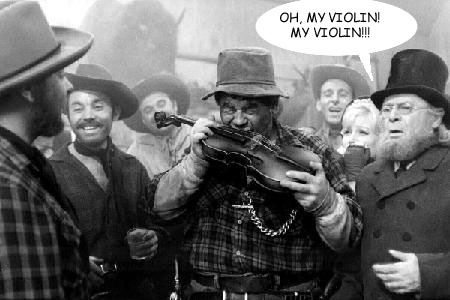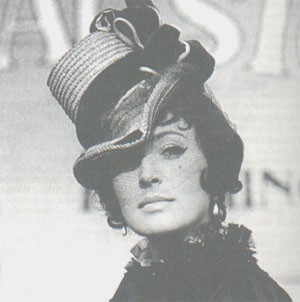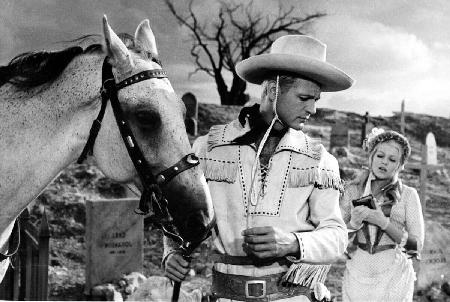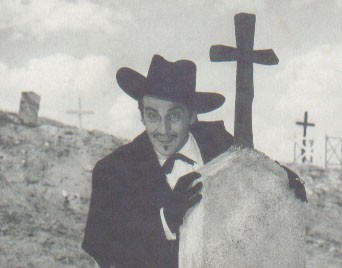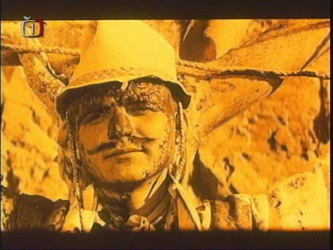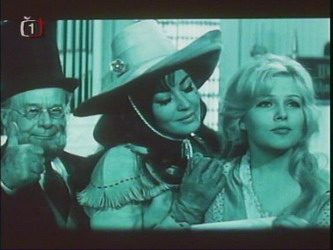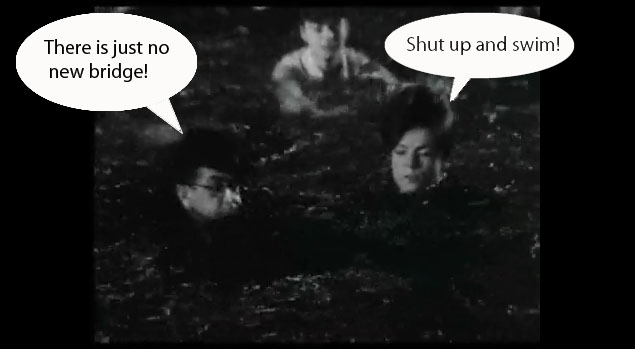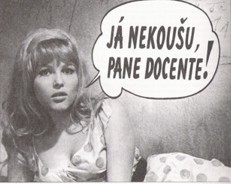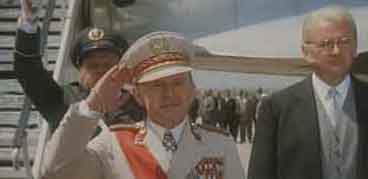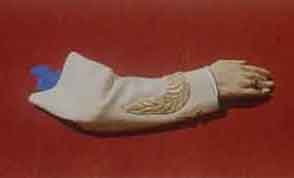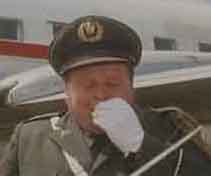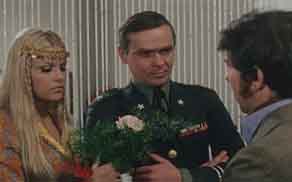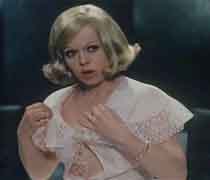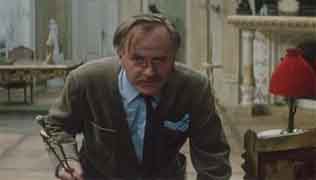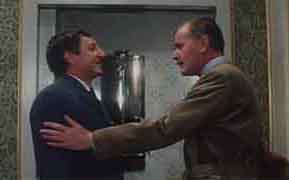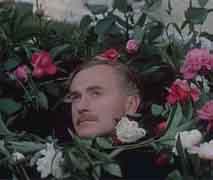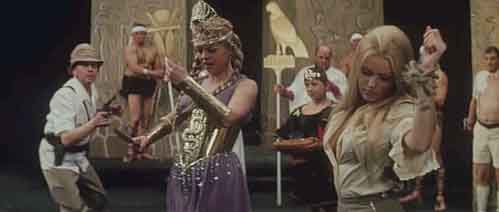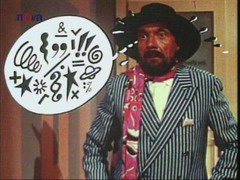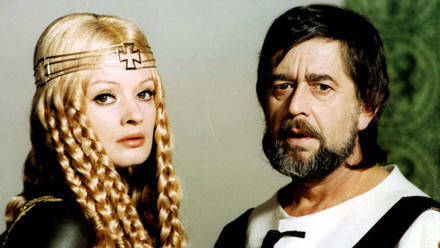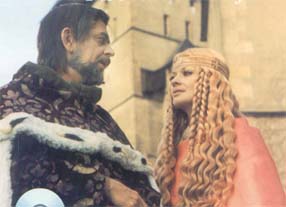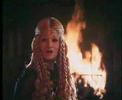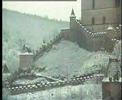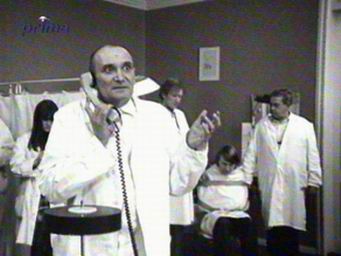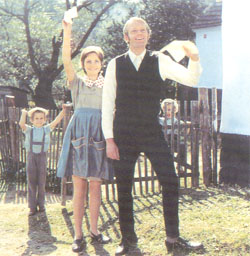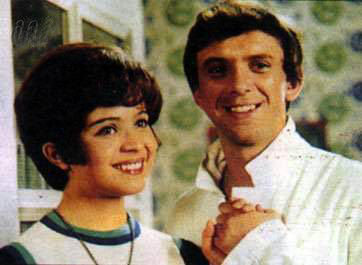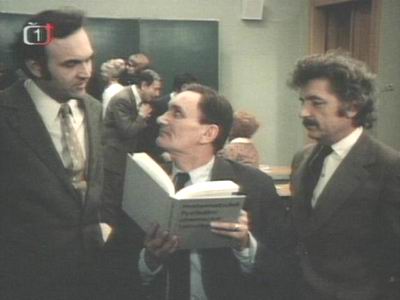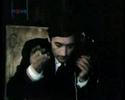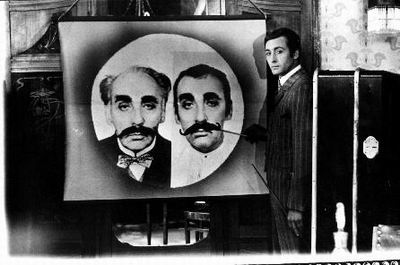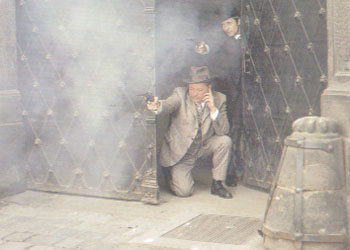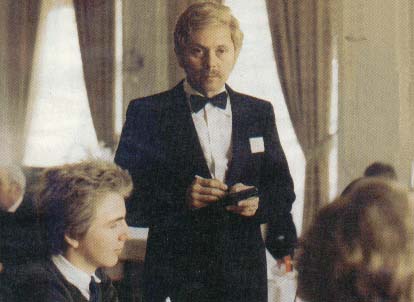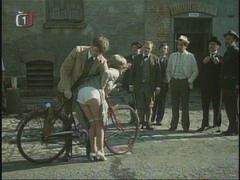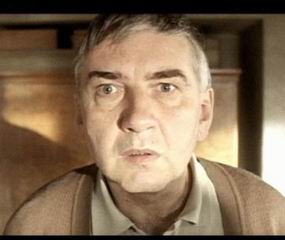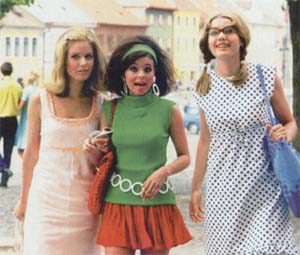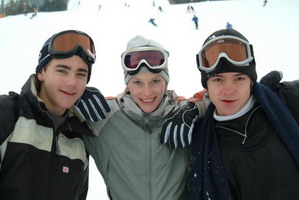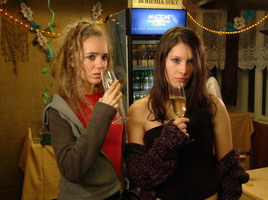This is another rich cathegory of the Czech cinematography. There are really lots of movies that could be listed, and although I have chosen only the most important ones, the list is quite large. Listing the oldest movies around WW II probably has little value for foreigners, but if the enumeration is to be complete, I can't leave out Škola, základ života or Kristián, because these films belong to the most popular titles of Czech cinema even after 60 years. I also understand that some comedies were addressed to Czech spectators and may not be comprehensible abroad. This may be true for some movies of Smoljak & Svěrák and especially for a row of "folk comedies" like Slunce, seno... However, my aim was simply to make a list of the most popular titles, nothing less and nothing more.
Among the directors of comedies I must stress three great personalities: at first Martin "Mac" Frič, the biggest star of Czech direction during the First Republic, and then Oldřich Lipský and Václav Vorlíček, who also made successful excursions into the world of fairy tales. While Vorlíček tended to comedies with fantastic elements written by his court screenwriter Miloš Macourek, Lipský's specialization were parodies, especially parodies of Western genres. In this context I should also list Jiří Menzel, but his movies were not comedies in the strict sense; they often balanced on the border of melodrama or bitter comedy.
Among the screenwriters there are four important names: the first one was Jiří Brdečka, the author of screenplays to Lipský's most successful parodies Limonádový Joe (Lemonade Joe) and Adéla ještě nevečeřela (Adéla hasn't had her dinner yet). The second name was the above mentioned Miloš Macourek, a man with unbelievable fancy, who belongs to the most important personalities in the history of Czech film production. Macourek mainly collaborated with Vorlíček, but he also wrote screenplays for other directors including Lipský. And eventually, there is a duo Zdeněk Svěrák & Ladislav Smoljak, two old friends, who especially collaborated with Oldřich Lipský, but Zdeněk Svěrák later wrote screenplays for Jiří Menzel and his son Jan Svěrák.
Among the directors of the youngest generation there was one promising name with great future: Jan Hřebejk, who successfuly collaborated with his friend-sreenwriter Petr Jarchovský. Unfortunately, their successful team-work, started in 1999 (Pelíšky/Cosy Dens) has a clearly declining tendency. The work of the Oscar winner Jan Svěrák contains several movies with comedy motives (Obecná škola/The Elementary School, Akumulátor/The Accumulator, Kolja, Vratné láhve/Empties), but I don't think he could be called a true comedy director.
36 movies included
Škola, základ života (1938)
(School, the fundamental of life)
Kristián (1939)
(Kristian)
Eva tropí hlouposti (1939)
(Eva plays the fool)
Přednosta stanice (1941)
(The Station Master)
Prstýnek (1945)
(The Ring)
Pytlákova schovanka (1949)
(The Poacher's Fosterdaughter)
Dovolená s Andělem (1952)
(Holidays With Anděl)
Dobrý voják Švejk (1956)
(The Brave Soldier Švejk)
Starci na chmelu (1964)
(Old men on hops)
Limonádový Joe (1964)
(Lemonade Joe)
Kdyby tisíc klarinetů (1964)
(If One Thousand Clarinets)
Bílá paní (1965)
(The White Lady)
Kdo chce zabít Jessii? (1966)
(Who Wants To Kill Jessie?)
Hoří, má panenko (1967)
(The Firemen's Ball)
Světáci (1969)
(The Wordlings)
Pane, vy jste vdova! (1970)
(Sir, you are a widow!)
Čtyři vraždy stačí, drahoušku (1970)
(Four Murders Are Enough, Darling)
Noc na Karlštejně (1973)
(A Night at the Karlštejn Castle)
Jáchyme, hoď ho do stroje! (1974)
(Jáchym, put it into the machine!)
Jak utopit doktora Mráčka aneb Konec vodníků v Čechách (1974)
(How to drown dr Mráček or the End of Water Sprites in Bohemia)
Marečku, podejte mi pero! (1976)
(Mareček, pass me the pen!)
Adéla ještě nevečeřela (1977)
(Adéla hasn't had her dinner yet)
Zítra ráno vstanu a opařím se čajem (1977)
(Tomorrow In the Morning I'll Wake Up And Scald Myself With Tea)
Vrchní, prchni (1980)
(Run, Waiter, Run)
Postřižiny (1980)
(The Short Cut)
Jak svět přichází o básníky (1982)
(How the World Loses Poets)
Slunce, seno, jahody (1983)
(Sun, Hay, and Strawberries)
Vesničko má, středisková (1985)
(My Sweet Village)
Obecná škola (1991)
(The Elementary School)
Dědictví aneb Kurvahošigutntag (1993)
(The Inheritance or Fuckoffguysgoodbye)
Kolja (1996)
(Kolya)
Pelíšky (1999)
(Cosy Dens)
Rebelové (2001)
(The Rebels)
Snowboarďáci (2004)
Obsluhoval jsem anglického krále (2006)
(I Served the King of England)Vratné láhve (2007)
(Empties)
Škola, základ života (1938)
(School, The Fundamental Of Life)
"Ich habe gesagt!"
One of the most memorable scenes: Ladislav Pešek as chronically failing student Áďa and František Kreuzmann as a professor of German.
Direction: Mac (Martin) Frič. Screenplay: Václav Wasserman after a theatre play and a humouristic novel of Jaroslav Žák. Music: Julius Kalaš. Starring: Antonín Novotný (Jindra), František Filipovský (Ludvík), Věra Gabrielová (Máňa), Ladislav Pešek (Áďa Čuřil), Richard A. Strejka (Tonda Holous), Zorka Janů (Jiřina), Theodor Pištěk (the director), Marta Májová (his wife), František Kreuzmann (professor Lejsal), Milada Smolíková (his wife), František Smolík (Mr. Gábrlík, a professor of biology), Ladislav Boháč (professor Bartoš), Jaroslav Marvan (professor Kolísko), Václav Trégl (professor Kaďousek), Karel Postránecký (professor Mykiska), Čeněk Šlégl (professor Lusk), Gustav Hilmar (the school porter).
An enormously successful title about students from a high school and their professors based on a humouristic novel of Jaroslav Žák, a high school teacher, who collected cheerful moments from his teacher's career. This movie doesn't have to be recommended to anyone in the Czech republic; even after more than 60 years it is exceptionally enjoyable and full of wonderful humour. Especially the performance of Ladislav Pešek as a chronically failing student is amazing.
One year later director Mac Frič filmed even another movie in this style with almost the same actors called Cesta do hlubin študákovy duše (The Way into the Depth of the Student's Soul, 1939) that is probably even better. While in the first movie the story dealt with an unrighteous accusation of one of the students, who is to be dismissed, here the students help to a shy professor of biology (performed by Jindřich Plachta), who is afraid of a state examen that could bring him more money on the salary cheque.
Škola, základ života (1938)
"Ich habe gesagt!"
Cesta do hlubin študákovy duše (1939)
Explosion
Cesta do hlubin študákovy duše (1939)
A French class
Kristián (1939)
(Kristian)
Direction: Martin Frič. Screenplay: Martin Frič, Josef Gruss, Eduard Šimáček after a theatre play by Yvan Noé. Music: Sláva E. Nováček. Starring: Oldřich Nový (Alois Novák/Kristián), Adina Mandlová (Zuzana), Nataša Gollová (Mařenka), Bedřich Veverka (Petr), Raoul Schránil (Fred), Jára Kohout (official Novotný), Jaroslav Marvan (director Král), Čeněk Šlégl (the seducer).
Alois Novák is an official working in a travel agency, the section Africa - the Orient. Once a month he saves up some money for evening adventures in Prague restaurants, where he presents himself as an elegant rich man and picks up with beautiful women. After an amazing evening he leaves them in a saloon and returns home. However, once he encounters Zuzana, who is not willing to accept this behaviour and she wants to learn more about him. Her enterprise leads to Alois' big problems both in his work and in his marriage.
A comedy that was successful even abroad and that is regarded as the most remarkable movie of the first republic era. Although I like it, I wouldn't say that it is a miracle. It largely depends on the usual standard of that time. By the way, it was the second big movie for Nataša Gollová after Příklady táhnou (Examples attract, 1939). Two months after the premiere of Kristian she shined as crazy Eva in the comedy Eva tropí hlouposti (Eva plays the fool).
A complete movie Kristián on
Eva tropí hlouposti (1939)
(Eva Plays The Fool)
Direction: Martin Frič. Screenplay: Vladimír Peroutka after a novel of Fan Vavřincová. Starring: Nataša Gollová (Eva Norová), Oldřich Nový (her brother Michal), Zdeňka Baldová (aunt Pa/Pavlína), Ella Nollová (Klotylda), Gustav Hilmar (factoryowner Záhorský), Marta Májová (his wife), Raoul Schránil (secretary Kučera alias dr. Jiří Novotný), Jiřina Sedláčková (Eliška), Josef Gruss (Zdeněk Kolář).
A movie that created the phenomena of Nataša Gollová - or the quest for the mystery of the Záhorský's rose. Young Eva Norová comes to spend her holidays at her good aunt Pavlína. She returns from a girl's boarding-school, where, as the whole family hoped, she would become a civilized, cultivated girl. But the expectations didn't come true. She still enters the house only through windows, and, among other things, feeds her aunt's golden fish by aspirine. But when Eva learns that her aunt will have a birthday, she wants to compensate the calamity in her house by a special gift. Their neighbour, factoryowner Záhorský, is a passionate gardener, and he created a very beautiful sort of rose. Eva bets with her brother Michal that she will steals this mysterious flower earlier than him and they both use different strategies: while Eva penentrates into Záhorský's house as a secretary pretending that she speaks French and English (which is not true), Michal chooses a role of an English lord (which is a keystone for their later nice conversations). In the end, the thrilling quest ends happily, although not so, how they imaginated...
After a summer comedy Příklady táhnou (Examples attract, 1939) and legendary Kristián (1939), this was the third big role of Nataša Gollová during the year 1939 - and undoubtedly the best. Here her comic talent was really discovered - and it was more than time, because she was 27 years old already! During the next two years, she went from role to role. Although this is not the title that I would rate among my most beloved comedies, the magic of young goofy Nataša is unforgettable.
Přednosta stanice (1941)
(The Station Master)
Direction: Jan Sviták. Screenplay: Václav Wasserman. Music: Jára Beneš. Starring: Vlasta Burian (Ťopka), Antonín Zacpal (the station master), Zita Kabátová (Julie), Jaroslav Marvan (the general inspector).
Ťopka is a little cheater, who likes leaving restaurants without paying. Once he goes by train without a ticket and is found by a general inspector, who subsequently pursuades him. He has no other possibility than to flee to the nearby station, where he dresses as a station master. By chance, the real station master left his work without permission and his frightened wife is afraid that he would be fired, so she pretends that Ťopka is her real husband. The general inspector stays at the station through the night and begins to tempt her, but Ťopka is open-eyed and he will even have merit in kicking the real station master upstairs.
This movie is regarded as the best comedy of Vlasta Burian and the most successful comedy of the 40's, so I list it here, but I said I am not a fan of his mostly infantile humour and I can't judge this opinion, because I don't understand his big popularity at all. On the other hand, it is not a bad title. By the way, Burian also sings a song called Přednosta stanice that later became an evergreen.
Prstýnek (1945)
(The Ring)
Direction: Martin Frič. Screenplay: Josef Neuberg, Josef Hlaváč after a story by Ivan Olbracht. Music: Eman Fiala. Starring: Otomar Korbelář (Jan Sochor/Sochor's father), Marie Blažková (Sochor's wife), Naděžda Vladyková (Sochor's mother), Vlasta Fabiánová (the duchess), František Smolík (the duke), Zdeněk Dítě (young duke Robert), Jana Dítětová (Baruška), Jindřich Plachta (the doctor), Jaroslav Marvan (the parson).
A Czech village in the end of the 19th century: Jan Sochor is a poacher, who continues in the tradition of his father. Once he visits a village parson, who relates him about miracles that happened in that place. He also states that the biggest miracle happened 20 years ago, when an old duke suffering from impotence pulled himself together here and his wife gave birth to a son. However, Sochor is laughing, because it was him, who caused the miracle, and relates about a sin of his youth and a ring that he got from the duchess. Several days after, the duchess' son comes to visit the village of his birth, pursuaded by his nervous mother, who wants to preclude a revelation of his father's origin. The young duke seems to be a very good youngster and ingratiates with the inhabitants of the village. But he meets a very nice girl and falls in love with her. It's Baruška, Sochor's daughter. The old Sochor is frightened and must do everything to stop this relationship...
The fifth most successful movie of Czech provenience after 1945: 5,3 million spectators in cinema houses. It is true that this visit rate was influenced by the fact that after WW II the Czech film industry was in temporary crisis and there were made only few movies (1944: 9, 1945:3, 1946: 12), but despite that it is a very pleasant, cheerful comedy, one of favourite movies of my childhood. Especially the second half is very funny.
Pytlákova schovanka (1949)
(The Poacher's Fosterdaughter)
Direction: Martin Frič. Screenplay: Rudolf Jaroš, Milan Noháč, Josef Neuberg, František Vlček. Starring: Oldřich Nový (René), Hana Vítová (Elén), Ella Nollová (Mrs. Hadrbolcová), Otomar Korbelář (Dubský), Theodor Pištěk (Skalský), Zdeněk Dítě (Sedloň), Bohuš Machník (Bolton), Vítězslav Vejražka (Malhorn).
A successful parody of pre-war movies and a swan song of Oldřich Nový in Czech cinema: Elén is a beautiful girl from a wood solitude, who wants to use her dramatic and singing talent in the world. But soon she almost falls into the dirt of the city and is unselfishly saved by a young violinist. At the same time, she mets rich millionaire René, who falls in love with her. The story ends almost tragically, when René dies from overworking, but love - combined with a miraculous medicine - can overcome even death.
This movie contains some really very good gags and belongs among the most popular comedies of the post-war era. I especially like the story of the poacher Dubský, who eventually discovers that he is a castle owner, who once lost memory and aimlessly wandered all around the world, until he knocked the door of a wood solitude and found refuge at a widow and her daughter. However, for me it is too slow-paced and I think that its humorousness sometimes almost dies due to the lack of any action (well, with the exception of the last cca 15 minutes). For Oldřich Nový it meant an end of his era of a Czech actor Number One. Since that time he hasn't been casted into any significant role (The Phantom Of Morrisville, 1966, being a rare exception). He was forced to dress a boiler-suit and second his more engaged colleagues in creative movies depicting the birth of Czech socialism.
Dovolená s Andělem (1952)
(Holidays With Anděl)
Direction: Bořivoj Zeman. Screenplay: Josef Neuberg, František Vlček, Jaroslav Mottl. Music: Dalibor C. Vačkář. Starring: Jaroslav Marvan (Anděl), Josef Pehr (Mašek), Josef Kemr (Vyhlídka), Vladimír Ráž (Pavlát), Jana Dítětová (Pavlátová), František Dibarbora (Štefan), Stanislava Seimlová (Marienka), Alena Vránová (the teacher), Josef Hlinomaz (Jeřábek), Jaroslav Mareš (Anděl's son)
After the enormous success of Pyšná princezna (The Proud Princess, 1952) director Bořivoj Zeman tried to make an unpretentious comedy about Prague tram controller Anděl and his adventures during holidays in a summer recreational centre. The title role was casted by Jaroslav Marvan, who had in the meantime become the biggest film star of the post-war era. Zeman was again lucky and the visit rate was very high. Three years later (1955) Zeman made a continuation of the story called Anděl na horách (Anděl In The Mountains). This time Anděl spent his winter holidays in the Tatra mountains in Slovakia, where he encounters his old friend, and later spends almost the whole time by a pushing investigation, who of the girls in the hotel is a spouse of his son. By the way, the girl was performed by Milena Dvorská, a very young charming actress, who was one of the biggest film discoveries of the 50's (see also Zeman's fairy tale Byl jednou jeden král, 1954).
Both comedies with Anděl hold in the top 10 of the 50's and even today often return on TV. They are mostly filled with tasteful folk humour, although the inspiration by contemporary "engaged" titles supported by communistic propaganda is visible. I have also heard that these two movies won a big popularity to Marvan in the countries of the eastern block, especially in Eastern Germany. In any case, it was probably the top of his career.
Dovolená s Andělem (1952)
English subtitles
Dobrý voják Švejk (1956)
(The Brave Soldier Švejk)
Direction: Karel Steklý. Screenplay: Karel Steklý after a novel of Jaroslav Hašek. Music: Jan Seidel. Starring: Rudolf Hrušínský sen. (Švejk), Eva Svobodová (Müllerová), Josef Hlinomaz (Palivec), František Filipovský (Bretschneider), Miloš Kopecký (padre Katz), Svatopluk Beneš (lieutenant Lukáš).
There exist three film adaptation of the brave soldier Švejk made in Czechoslovakia (and one animate version). The first two were made before WW II (one is mute). The third adaptation with Rudolf Hrušínský is by far the best. The first part called Dobrý voják Švejk deals with Švejk's coming to the army and his short hospitalization in a mental house. Then he is assigned as a servant to lieutenant Lukáš and soon after he becomes a nightmare for him. Lukáš asks Švejk for a dog and Švejk steals one, but it turns out that the dog belongs to a high officer, who consequently sends both Lukáš and Švejk to the Russian front. Švejk misses a train to the front and walks from Prague to České Budějovice on foot. On the way he experiences various adventures and in one village he is also prisoned by policemen and regarded as a Russian spy. In the end he reaches České Budějovice and frightens his lieutanant, who hoped that Švejk had died.
In the second part called Poslušně hlásím (I report duteously, 1957) Švejk and Lukáš arrive to the front, where their division suffers from orders sent by a brain-sick officer. After several days Švejk gets lost and later is captured dressed in a Russian uniform. He is regarded as a deserter and at the last moment is saved in face of his execution. Hašek didn't finish his novel due to his premature death, so the end is fabricated by Steklý, but it didn't harm the final result.
František Filipovský (as police provocateur Brettschneider) and Josef Hlinomaz (as pub owner Palivec)
http://www.youtube.com/watch?v=ib7WhQKH91o&feature=related
Brettschneider: "Mr. innkeeper, here you once had a picture of the Emperor?!"
Palivec: "Yes. I had. But I gave it on the attic, because flies shitted on it. You know, someone could comment it, and I could have troubles. I just don't need it."
Starci na chmelu (1964)
(Hop Side Story/The Hop Pickers)
Direction: Ladislav Rychman. Screenplay: Vratislav Blažek, Ladislav Rychman. Music: Jiří Bažant, Jiří Malásek, Vlastimil Hála. Lyrics of songs: Vratislav Blažek. Songs are sung by Karel Gott, Josef Zíma, Jana Petrů, Jana Malknechtová, Karel Štědrý. Starring: Vladimír Pucholt (Filip), Miloš Zavadil (Honza), Ivana Pavlová (Hanka), Irena Kačírková (the professor), Josef Kemr (the chief of agricultural cooperative), Libuše Havelková (Kateřina).
Starci na chmelu is regarded as the first and also the best Czech musical that has ever been made. Personally, I rate Noc na Karlštejně higher. It relates about a voluntary work of high school students and more exactly about a "banned" love of two of them. The role of idealistic boy Filip is the best part of Vladimír Pucholt in his short actor's career.
Limonádový Joe (1964)
(Lemonade Joe)
Direction: Oldřich Lipský. Screenplay: Jiří Brdečka, Oldřich Lipský. Based on a book and a theatre play of Jiří Brdečka. Music: Jan Rychlík, Vlastimil Hála. Lyrics of songs: Jiří Brdečka, Vratislav Blažek, Pavel Kopta, Jan Rychlík. Songs are sung by: Yvetta Simonová, Jarmila Veselá, Karel Gott, Miloš Kopecký, Waldemar Matuška. Starring: Karel Fiala (Limonádový Joe), Rudolf Deyl jr. (Doug Badman), Miloš Kopecký (Horác Hogofogo), Květa Fialová (Tornado Lou), Olga Schoberová (Winnifred Goodman), Bohuš Záhorský (Goodman, her father), Josef Hlinomaz (Gripo), Waldemar Matuška (Coyote Banjo Kid), Karel Effa (Pancho Kid), Vladimír Menšík and Jiří Lír (barmen).
Trigger Whisky Bar, Stetson City, Arizona: Beautiful Winnifred Goodman with her father make enlightement against alcohol in a whisky bar owned by Doug Badman. When they are assailed by rough gunman Gripo, a hero called Lemonade Joe comes to save them. The men drinking whisky are inspired by his accurate gunsight and move into a new lemonade saloon. At the same time, Tornado Lou, the Arizona yellowthroat and Badman's biggest star, falls in love with him. It seems that Doug Badman will soon bankrupt... However, Badman's brother, desperado Hogofogo appears in the city to help him. He kidnaps Winnifred and with the help of Badman's men, gunmen Gripo, Coyote Banjo Kid and Pancho Kid, even Lemonade Joe is captured and is to be executed. At the last moment he is saved by Tornado Lou, who knows that he will never love her (and he will never make her a better woman), because his heart belongs to the sweet Winnifred.
Lemonade Joe betrays that he is son of lemonade producer Kolalok and originally he had three siblings, but they got lost in a sandy storm, when his parents travelled to the west. They all have a unique identification sign - a cacao spot of the Mexican dollar's size (or a Mexican dollar of the cacao spot's size???). In the end, Lemonade Joe learns that Doug Badman, Hogofogo and Tornádo Lou are his lost brothers and a sister, because they posses this sign. Fortunately, the sweet Winnifred doesn't have it, so there are no bareers in their love...
A legendary parody of western stories that achieved international success. (And the first significant role of Olga Schoberová in Czech cinema, which is an event worthy of note by itself) . It is known how Henry Fonda enjoyed it at the international film festival in Karlovy Vary (Karlsbad). The story was invented by Jiří Brdečka and was first published in 1940 in a weekend magazine. Later it was transformed into a theatre play. The role of Joe had been at first offered to Jiří Kodet, who was already to sign a contract for this movie, but the creators then saw Karel Fiala in some theatre play and gave the role to him. It was a lucky choice, because he was really unbelievably good. However, he has never been casted in any other remarkable movie and acted only in theatre. Jiří Brdečka later collaborated with Oldřich Lipský on another excellent parody Adéla ještě nevečeřela (Adéle Hasn't Had Her Dinner Yet, 1977; see below).
Personally I more like Lipský's "Adéla". Although Lemonade Joe contains a lot of excellent and often really genial gags ("Oil!" "Gold!" "Mr. Kolalok, on change you have won five million...no, billion dollars!" - I do hope that sometimes in the future I will add short video trailers) in almost every minute, I have reservations against the overlaboured and formless story line in the middle and I also remember that as a child, I was bored by the long animated passage accompanied by the singing of Miloš Kopecký. (Surprisingly, some people regard it as the best sequence in the movie!) Nevertheless, Miloš Kopecký's part of Hogofogo is my favourite actor's performance here.
See also comments on www.imdb.com
Limonádový Joe (the beginning) http://www.youtube.com/watch?v=H7X2iDcJpbI (Sorry for the non-sensical English; it is not to represent true English language!)
Tornado Lou sings "Whiskey,to je moje gusto!" http://www.youtube.com/watch?v=wtAVCVMKpD0&feature=related
Limonádový Joe sings "Goodbye" http://www.youtube.com/watch?v=3pP7RVGlJBQ&feature=related
Sweet Winnifred sings "Arizona" http://www.youtube.com/watch?v=o7IofjIMm2I&feature=related
Horác Hogofogo sings "Gwendolin - the song of a blind, deaf piano tuner" http://www.youtube.com/watch?v=4Jvs9vUd_mY&feature=related
Limonádový Joe sings "My God, my God" http://www.youtube.com/watch?v=zipJ0Ee4x40&feature=related
...and a
Video taken from the English dubbed version
http://video.google.com/videoplay?docid=6891926762791480817&hl=en
Joe is eventually captured and tortured... Nevertheless, the movie has a happy end!
Kdyby tisíc klarinetů (1964)
(If One Thousand Clarinets)
Direction: Ján Roháč, Ladislav Rychman. Screenplay: Jiří Suchý, Ján Roháč. Music: Jiří Šlitr. Lyrics of songs: Jiří Suchý. Starring: Jana Brejchová (Tereza), Waldemar Matuška (Patrik), Hana Hegerová (Edita), Eva Pilarová (Klaudia), Karel Gott (Benjamin), Jiří Suchý and Jiří Šlitr (the paratroopers), Pavlína Filipovská (Pavlína), Jana Malknechtová (Jana), Jiří Jelínek (Nicolas), Vlastimil Brodský (colonel Helmuth), Martin Růžek (the minister), Darek Vostřel (1st major), Václav Lohniský (2nd major), Rudolf Cortés (the chief of music), Jiří Menzel (Schulze), Jan Pohan (Kraus), Juraj Herz (Kyncl), Bohumil Šmída (the chief of TV).
Young pacifist, soldier Schulze has deserted from a military garrison near a spa Arrakis and his feat has strange consequences: all weapons and military technique that crosses the border of the town changes into musical instruments. The ministry of war is frightened and send an army unit that is to again establish discipline. However, tanks change into pianos and even paratroopers, who land from the sky, have saxophones instead of machine guns. In the meantime, a TV company Telvis takes advantage of this miracle and prepares a big show in the town.
Another musical after Starci na chmelu was even more successful (at least in the statistics of the visit rate). The story was inspired by Jiří Suchý, a member of a popular theatre duo Suchý-Šlitr, who are authors of a lot of legendary songs. Together with them the elite of the Czech pop scene took place in it. The role of Schulze was casted by beginning director Jiří Menzel, who two years later got an Oscar for Ostře sledované vlaky (The Closely Watched Trains).
Bílá paní (1965)
(The White Lady)
Direction: Zdeněk Podskalský. Screenplay: Karel Michal (on the grounds of his own story), Zdeněk Podskalský. Music: Evžen Illín. Starring: Vlastimil Brodský (castle guide Pupenec), Rudolf Hrušínský (town chairman), Miloš Kopecký (secretary), Irena Kačírková (the White Lady), Jiřina Bohdalová (Andula), Josef Bek (Kudrna), Čestmír Řanda (dr. Tomeček), Václav Voska (psychiatrist Boukal), Vlasta Chramostová (Mrs. Pupencová).
Mr Pupenec has been appointed as a new castle guide of a South Bohemian castle. One evening at full-moon, he spents too much time in a local pub. The whole company of drunked people then heads to the castle, where they intend to wake up the ghost of the White Lady Perchta, who is hidden in her medieval portrait. Mr Pupenec accidentally succeeds in deciphering a Latin magic formula and the White Lady subsequently leaves the painting - in order to do good and supply the work of incapable communist leaders - which causes immense panic in the whole district. While the local communist bosses are forced to acknowledge her existence and want to (ab)use her abilities for their own profit, their superior colleagues are terrified: The image must disappear at any cost!
One of the best movies made by Zdeněk Podskalský (besides "Světáci/The Wordlings" and "Noc na Karlštejně/A Night At The Karlštejn Castle"). A surprisingly bold, sharp satire on the communist regime inspired by South Bohemian folk legends about the White Lady Perchta of Rožmberk. It is remarkably witty and ridicules the Communist regime virtually ad absurdum (e.g. the use of some popular "pioneering" slogans by the communist functionary, who just went mad). Especially worthy of note is the grotesque final scene, where a hypnotized crowd of town's people enters a river at a place, where the White Lady was supposed to build a new bridge. No wonder that this hilarious satire appeared on the "black list" and after 1968 it was banned for two decades.
http://www.youtube.com/watch?v=pu4icCETa98&feature=related
Kdo chce zabít Jessii? (1966)
(Who Wants To Kill Jessie?)
"I don't bite, Mr docent!" Direction: Václav Vorlíček. Screenplay: Miloš Macourek, Václav Vorlíček. Starring: Jiří Sovák (Mr Beránek), Dana Medřická (Mrs Beránek/docent Beránková), Olga Schoberová (Jessie), Juraj Višný (Superman), Karel Effa (the gunman), Vladimír Menšík (Kolbaba), Valtr Taub (the professor), Karel Houska, Ilja Racek (colleagues), Jan Libíček (the warder).
Docent Beránek is a passionate reader of comics stories. His wife, who is a scientist too, develops a machine that can materialize human dreams. Once she tests it on her husband, who is just dreaming about a comics girl called Jessie that is pursuaded by two wrongdoers, Superman and a gunman. The materialization of these figures - who naturally speak only in bubbles - causes big problems in Beránek's private life, and the appearance of Jessie arouses his wife's jealousness. Eventually she decides to destroy them and her husband is prisoned. But the comics figures seem to be indestructible and Beránek saves his beloved Jessie with the help of his degravitational gloves.
A very successful title, the first big movie of Václav Vorlíček and Miloš Macourek that started their fertile collaboration on fantastic comedies. The creators were even invited to the United States, where they were to prepare an American remake, but the events of 1968 broke it. It's interesting that Superman is presented as a wrongdoer here, but for Czech spectators it made no difference, because his true nature was not widely known (Western comics were largely unknown then). His performer, Juraj Višný, is a legend of the Czechoslovak bodybuilding. And, of course, I must also specially list Olga Schoberová, whose sex-appeal often steals the whole scene.
Hoří, má panenko (1967)
(The Firemen's Ball)
Direction: Miloš Forman. Screenplay: Miloš Forman, Jaroslav Papoušek. Music: Karel Mareš. Starring: Jan Vostrčil (the chairman of the ball staff), František Svět (the old fireman), Josef Kolb (Josef), Milada Ježková (his wife), Josef Šebánek, Josef Valnoha, František Debelka, Josef Řehořek, Vratislav Čermák etc.
A group of firemen holds an annual ball, where they are to give a present to their former chief. Simultaneously, they try to make a beauty contest (but there is not a lot of pretty girls) and have problems with tombola that is stolen away. In the end, the most honest fireman wants to return a collared pork that was stolen by his wife, but by an irony of fate, he is regarded as a thief.
The movie looks like an ambitious amateurish attempt and was shot with non-actors, which was Forman's usual preference. Despite that it is quite popular and known even abroad. It is actually something like a "satire on the average Czech man". However, although it contains a few amazing scenes (the one with the collared pork being returned by the fireman is especially good), the reason of its popularity lies beyond the limits of my comprehension (a part of the reason may be that this was the last movie of Miloš Forman that was made in Czechoslovakia). I feel ashamed that Czech cinematography must be represented in the world by such titles. There is a lot of much better movies that are practically unknown. Instead, foreign spectators admire such "masterpieces" like this, although I don't say that The Firemen's Ball is bad. In any case, don't expect that I would list another Forman's "masterpiece", Lásky jedné plavovlásky (The Loves Of A Blonde, 1965). That would be already too much.
Světáci (1969)
(The Wordlings)
Direction: Zdeněk Podskalský. Screenplay: Vratislav Blažek. Music: Evžen Illín, Vlastimil Hála. Starring: Jiří Sovák (Skopec), Vlastimil Brodský (Prouza), Jan Libíček (Petrtýl), Jiřina Bohdalová (Božka), Jiřina Jirásková (Marcela), Iva Janžurová (Zuzana), Jiřina Šejbalová (Trčková), Oldřich Nový (Dvorský), Vladimír Menšík (Novák).
Three village bricklayers work in Prague and want to enjoy their stay in the city. Therefore, they decide to pretend that they are intelligents loving science and art and want to make an impression on three prostitutes, who also don't want to lag behind with their encyclopedic knowledge.
A very successful folk comedy, even today very popular. The last remarkable movie of Oldřich Nový, the legend of the pre-war cinema.
Pane, vy jste vdova! (1970)
(Sir, you are a widow!)
Direction: Václav Vorlíček. Screenplay: Miloš Macourek, Václav Vorlíček. Music: Svatopluk Havelka. The title song is sung by Petr Spálený. Starring: Iva Janžurová (Evelyna Keletti), Jiří Hrzán (Stuart Hample), Jan Libíček (Bobo), Jiří Sovák (king Rosebud IV.), Olinka Bérová=Olga Schoberová (Molly), Eduard Cupák (Steiner), Čestmír Řanda (general Otis), Otto Šimánek (Keletti), Lubomír Kostelka (Keletti's secretary), Luděk Kopřiva (the theatre director), Vladimír Menšík (Koko Bluhm), Helena Růžičková (Mrs. Stub), Miloš Kopecký (head physician Somr), Vlastimil Hašek (Somr's collaborator), Jaroslav Mareš (the one-eyed general), František Filipovský (king Oscar XV.), Stella Zázvorková (Otis' wife), Zdeněk Svěrák, Ladislav Smoljak (theatre critics).
A closely unrecognized Middle European monarchy: King Rosebud IV. welcomes king Oscar XV., who comes to visit his country. During a ceremony on the airport officer Bobo disconsolately cuts off Oscar's hand with his sword and king Rosebud decides to a serious move: to abolish army that only endangers people. Yet endangered officers led by ruthless colonel Steiner (who resents blood) and general Otis don't like it at all and plan a conspiracy against the king. The first attempt to kill him in a lift is thwarted by a prophecy of genial astrologer Stuart Hample, Bobo's friend platonically loving film star Molly, Steiner's spouse. Hample foretells that soon he will become a widow and in the end, Molly will become his wife. Nobody believes him, but stars never lie and soon it turns out that he was true.
The conspirators decide to kill Hample and prepare another assassination, for which they want to use a method of professor Somr, who can transplant human brains and create artifical humans. The brain of Mrs. Stub, a mass murderer, is to be implanted into an artifical woman modelled after the king's favourite actress, Evelyna Keletti. Yet the brain of Mrs. Stub is confused with the brain of dead Stuart, who consequently finds himself in the body of artifical Evelyna and together with his friend Bobo, now Steiner's servant, wants to save the endangered king. In the course of following events, the family of real actress Keletti is exterminated, Stuart really becomes a widow, Molly is almost torn into pieces by a bomb, her fresh husband is killed, general Otis mistakenly cut down, and Stuart even once changes a body (you can bet for whose) and becomes Molly's husband, who saves the king.
Bobo's unhappy act on the airport starts a chain of tragical events that will change the life of many people in the country.
Bobo is fired and asks his friend Stuart for help. Stuart states that Bobo will stay at the army and saves his life. But Stuart himself will die, become a double widow, and then will marry both Molly and her spouse Steiner. It makes no sense, but stars don't lie, Bobo! Stuart thus visits Molly and Steiner and informs them about their future common life. But his offer of a group marriage is refused. And in a while, he finds himself in the body of Evelyna that was originaly destinated for Mrs Stub.
Rich factoryowner Mr. Keletti (O. Šimánek) is very jealous of his famous wife, actress Evelyna Keletti. The days of her life are counted up, when he confuses her with half-naked artifical Evelyna in the window of Steiner's house. His loyal secretary (L. Kostelka) does everything what he can to save his lord from prison...
But his effort eventually leads to a tragic end...
In the meantime, the king is invited to the first night of a new theatre play starring his favourite Evelyna Keletti (Molly Adams included). But the course of the theatre tragedy will be soon interrupted by mass killer Mrs. Stub in the body of artifical Evelyna.
Her part will be unforgettable and will end unhappily for Steiner's friend, ambitious actor Guggenheim, whose "mistakenly inserted" live cartridges are destined for the king in the theatre box.
A totally crazy comedy full of intelligent black humour, dominated by Iva Janžurová. For this role she later got an award for the best actor's performance at the international festival of fantastic movies in Terst. Beside her the majority of the best Czech comedians of that time was engaged to achieve an excellent result. Pane, vy jste vdova! is undoubtedly the best title of Václav Vorlíček & Miloš Macourek in this genre and one of the best Czech comedies that have ever been filmed. Although they made a lot of good movies and serials even later, I think that this was the top of their lifelong collaboration. It may not be a comedy, where you would always be dying from laugh, but many things were very well done here - from direction, acting, music (the title song) to visual elaboration (here I mean especially the beauty of Olga Schoberová that gets this movie into a different dimension, and costumes made by later Oscar winner Theodor Pištěk). Miloš Macourek once said that the final scene in the theatre consisting of several murders and slaughters was his most beloved. The creators even didn't forget to make fun of some pillars of the Western capitalist democracy (the journalists refusing to leave Otis' house because of their journalist's cards). Vladimír Menšík in a minor role of Stub's boyfriend, Koko Bluhm, is also amazing. By the way, the movie also contains some jokes that foreigners won't understand: For example, the chapel on the airport plays a reception march containing a melody of one popular Czech folk song.
See also comments on http://www.imdb.com/
The title song (Petr Spálený): http://filmovezvuky.ic.cz/mp3/09_pane_vy_jste_vdova.mp3
A short "trailer" with the title song (sung by some singer-woman)
Theatre play
And my own contribution - the opening sequence
Čtyři vraždy stačí, drahoušku (1970)
(Four Murders Are Enough, Darling)
Direction: Oldřich Lipský. Screenplay: Miloš Macourek after a novel of Nenad Brixi "No Admittance To The Dead". Music: Vlastimil Hála. Lyrics of songs: Pavel Kopta. Sung by Eva Olmerová. Paintings by Kája Saudek. Starring: Lubomír Lipský (George Camel), Jiřina Bohdalová (Sabrina), Iva Janžurová (Kate), Marie Rosůlková (Mrs Harrington), František Filipovský (inspector Sheridan), Jan Libíček (policeman Brooks), Lubomír Kostelka (policeman Davidson), Vlastimil Hašek (policeman Harley), Josef Hlinomaz (Gogo), Karel Effa (Kowarski), Stella Zázvorková (Peggy), Josef Kemr (the toothed gangster), Jaroslav Moučka (Tom), Zdeněk Kryzánek (Bill), Zdeněk Řehoř (the psychiatrist).
George Camel is a shy, goodhearted teacher from a little American town. His life will change forever, when one evening somebody rings the bell on his door and when he opens it, he sees a dead man with a knife in his back. Since that time, other dead bodies begin to cumulate in his house and Camel is mistakenly regarded as a mass murderer. Nobody - including him - knows that he found himself in the middle of a war of two criminal gangs, who are looking for one million dollar's check that was in the coat of the first dead man. Although police eventually learns that Camel is inguilty, he himself wants to use his murderer's reputation to make an impression on his beloved Sabrina, a journalist from a local newspaper. But the game draws to a dramatic end, when Camel finds out what's the matter and the gangsters don't hesitate to get the check out of his body even at the cost of an offhand operation.
Another funny parody of Oldřich Lipský, who used Macourek's screenplay based on a serious criminal novel of Yugoslavian writer Nenad Brixi. Rumour has that after Brixi learned, what a slapstick they made of his serious drama, he was enormously upset and wanted to take it to court. Fortunately, he didn't thwart the filming of this hilarious comedy that parodizes both gangster's movies and the world of American comic stories. Some people rate it lower than other Lipský's comedies like Lemonade Joe, but personally I think that it is not so far. It may be even funnier than contemporary Vorlíček's Pane vy jste vdova that was also based on Macourek's screenplay. In any case, it contains more "action" and more memorable dialogues and gags ("Give me the feck, I faid"). The title role was casted by the director's brother Lubomír (Lipský) and Iva Janžurová, who previously performed artifical Evelyna, now got a role of a gangsters' boss. The "advertisement" paintings that periodically interrupt the story were created by Kája Saudek, a legend of Czech comics, and brother of famous photographer Jan Saudek.
(George just swallowed a 1-million dollar check. Gangsters are planning an operation over his body)
GANGSTER: Is anybody here a doctor, gentlemen?
gangster-doctor: Here, please, I am... a veterinary doctor.
GANGSTER: So what? A cow has four stomachs. This here has only one.
GANGSTER-DOCTOR: But I can't sew!
GANGSTER: Never mind! I served out as a tailor in Vienna. Where do you have a sewing machine?
---
GANGSTER: Do you have all semesters?
GANGSTER-DOCTOR: Hmm... Of course... I had a distance learning.
GANGSTER: Within what a distance?
GANGSTER-DOCTOR: Brazil - New Zealand.
GANGSTER: Damn, that's a big distance!
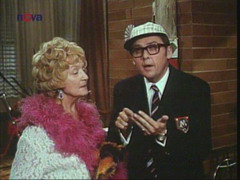

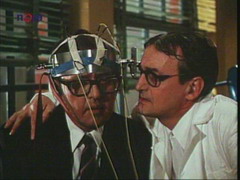
Photographs taken from http://www.meteleskublesku.cz/?movie=44
Noc na Karlštejně (1973)
(A Night at the Karlštejn Castle)
Direction: Zdeněk Podskalský. Screenplay: Zdeněk Podskalský. Based on a theatre play of Jaroslav Vrchlický. Music: Karel Svoboda. Lyrics: Jiří Štaidl. Starring: Vladimír Brodský (Karel IV.), Jana Brejchová (Eliška Pomořanská), Karel Höger (Arnošt of Pardubice), Daniela Kolářová (Alena), Jaromír Hanzlík (Pešek), Jaroslav Marvan (the burgrave), Miloš Kopecký (the Bavarian duke), Waldemar Matuška (Cyprian king Petr), Slávka Budínová (Lady Ofka).
1363: King Karel IV. just married a new wife, Alžběta Pomořanská. However, the king is very busy and can't devote his time to Alžběta, who suffers from solitude. Therefore, when she finds out that the king will arrive to the Karlštejn castle, she decides for a risky enterprise: to break the king's order and, dressed as a page, to penetrate into the castle, where he prohibited entrance to all women. Simultaneously, a young girl called Alena wants to do the same (dressed as a page), because she betted with her (momentarily drunked) father that she would spend one night at the Karlštejn castle and got permission for a wedding with the king's cupbearer Pešek. But for both, the night adventure at Karlštejn will be more thrilling than expected, because the castle is honoured by the visit of the Bavarian duke and the Cyprian king, who are waiting for the king's arrival, but simultaneously undertake a private investigation, if the rumour about the king's prohibition is based on reality...to the panic of the burgrave, Alena's uncle. In the end, love wins over a senseless command and the gates of Karlštejn are opened for womankind.
A wonderful musical with wonderful songs composed by Karel Svoboda, who had perhaps the luckiest period of his production. One of my favourite movies. A lot of popular singers of that time (headed by Waldemar Matuška) took part in it. The title song Lásko má, já stůňu (My love, I am sick) sung by Helena Vondráčková soon became an evergreen and even today is very popular. Several years ago a CD soundtrack of this movie was published.
Daniela Kolářová as Alena Jana Brejchová as the Empress Alžběta Pomořanská and Vlastimil Brodský as the Emperor Karel IV.
The queen sings "Lásko má, já stůňu" (My love, I am ill)
ENJOY!
Women are eventually allowed to stay at Karlštejn...and Waldemar Matuška sings the final song
Jáchyme, hoď ho do stroje! (1974)
(Jáchym, put it into the machine!)
Direction: Oldřich Lipský. Screenplay: Ladislav Smoljak, Zdeněk Svěrák, Oldřich Lipský. Music: Zdeněk Liška. Starring: Luděk Sobota (František Koudelka), Marta Vančurová (Blanka), Věra Ferbasová (the aunt), Josef Dvořák (Béďa Hudeček), Ladislav Smlojak (chief Karfík), Zdeněk Svěrák (psychologist Klásek), Václav Lohniský (dr. Chocholoušek), František Husák, Josef Hlinomaz (Chocholoušek's employees), František Peterka (the chief of the judo club), Petr Nárožný (the car racer).
František Koudelka is a motor mechanic, who works in a local agricultural co-operative. Thanks to his aunt he gets a favoured job in a luxurious car service in Prague. On the way to the city he gets to a meeting propagating conditiograms, a sure scientific way how to be successful based on biological biorhythms. He buys one and arrives to Prague, where he is housed at his aunt and shares one room with her dog that sleeps dressed in pyjamas, stars at exhibitions and must be walked every evening. The next day he is employed in the car service, where every three months one of mechanics gets mad of big salaries and ends in a mental house directed by dr. Chocholoušek. František soon finds out that the conditiogram may really work and he also offers it to his colleague Béďa. After some time František falls in love with a waitress from a restaurant, who returns his interest, but it seems that it won't be easy for him, because her strong-arm colleague loves her too. His new girl-friend invites him to a judo club... I think it makes no sense to continue, because the end of the movie is enacted in the style of a crazy comedy and there wouldn't be enough space for the description of all situations, where František takes part. I only add that he is eventually pursuaded by dr. Chocholoušek and his men, because it seems that he got mad, but fortunately, he is mistakenly confused with his colleague Béďa, then with a Japanese artist, a nervous car racer, a judo-competitor, and, in the end, with his rival in love, who all end at Chocholoušek's clinic.
Jáchyme, hoď ho do stroje is the first movie written by Smoljak & Svěrák and the first bigger film opportunity for a lot of future popular comedians (Luděk Sobota, Petr Nárožný, Josef Dvořák). The result was exceptionally good (the most successful movie of the 70's!) and "Jáchym" became one of classic comedies of Czech cinema. The authors once said that they had been afraid of failure, so they had invented so many gags that it would have been enough for several good movies. A lot of figures and dialogues later became a part of the national folk-lore, especially crazy dr. Chocholoušek and his employees. However, personally I think that this is not the type of a comedy that would be advisable for foreign spectators.
Chocholoušek's men are always prepared for action. But this time it seems that again they haven't caught the right man... However eventually everything ends happily, because František just has a scientifically proved conditiogram.
Jak utopit doktora Mráčka aneb Konec vodníků v Čechách (1974)
(How to drown dr Mráček or the End of Water Sprites in Bohemia)
Libuše Šafránková as Jana and Jaromír Hanzlík as dr. Mráček Direction: Václav Vorlíček. Screenplay: Petr Markov, Václav Vorlíček, Miloš Macourek. Music: Vítězslav Hádl. Songs are performed by Valerie Čižmářová, Václav Neckář and Helena Vondráčková. Lyrics: Petr Markov. Starring: Libuše Šafránková (Jana), Jaromír Hanzlík (dr. Jindřich Mráček), Miloš Kopecký (Mr Wassermann), Míla Myslíková (Mrs Wassermannová), Zdeněk Řehoř (Alois), Vladimír Menšík (Karel), František Filipovský (Bertík), Stella Zázvorková (doc. Mráčková), Eva Trejtnarová (Polly Wassermannová), Čestmír Řanda (Albert Bach), Jiří Hrzán, Miroslav Masopust (young German mermen).
Mr. Wassermann is the head of a water sprites' family and also the head of all water sprites in Bohemia. His family is namely the last surviving one. They live in an old wet house on a Prague embankment that is to be soon demolished. Wassermann knows that it would be a disaster for his collection of human souls that is situated in a flooded cellar and he wants to avert it in any way. The basic step is to drown young lawyer Mráček, who issued the order. Wassermann wants to use the grace of his niece Jana, who nevertheless falls in love with him and becomes his only hope for survival in the insidious deathmatch with her family.
This is another sci-fi comedy with fairylike motives written by Vorlíček & Macourek (together with Petr Markov). A very good and adequately successful title, a guarantee of good entertainment even after almost 30 years.
A note: Originally one of the leading roles of Jana's uncles was casted by Jan Libíček, who unexpectedly died just during the filming.
Marečku, podejte mi pero! (1976)
(Mareček, pass me the pen!)
The authors of the screenplay also performed minor roles of adult louts (Zdeněk Svěrák on the left, Ladislav Smoljak on the right). In the middle Václav Lohniský as class truckler Hujer. Direction: Oldřich Lipský. Screenplay: Ladislav Smoljak, Zdeněk Svěrák. Music: Svatopluk Havelka. Starring: Jiří Sovák (Jiří Kroupa sen.), Jiří Schmitzer (Jiří Kroupa jr.), Míla Myslíková (Kroupová), Václav Lohniský (Hujer), Iva Janžurová (Týfová), Josef Kemr (Plha), Ladislav Smoljak (Tuček), Zdeněk Svěrák (Šlajs), Josef Abrhám (Janda), Taťjána Medvecká (Eva Tůmová), Jaroslava Obermeierová (Zíková), František Filipovský (the teacher of chemistry), Petr Nárožný (Týfa), František Kovařík (professor Hrbolek).
Another legendary comedy of Smoljak & Svěrák, this time a story about an old worker in a factory, who wants to attain a better position and is forced to attend a night-school to get a leaving exam. However, soon it turns out that it won't be easy for him, but he will hopefully finish it with the help of his son...
Personally I don't like it so much like "Jáchym" or "Vrchní, prchni" (see below), because it doesn't contain such a sort of crazy humour that I like, but it is likewise a very popular movie in the country, again thanks to a lot of legendary statements. But like in the former case of "Jáchym", I wouldn't recommend it to foreigners. By the way, the most known figure from this movie is Mr. Hliník, who never appears there (if you don't understand why, ask some Czech and he will explain it to you). In a town Humpolec he recently got a memorial devoted to him.
A note: Jiří Sovák appeared here together with his son Jiří Schmitzer (who performed his son). A little role of a boy, who brings a message (with a bonbon) to the professor of chemistry was the first film appearance of Tomáš Holý.
Adéla ještě nevečeřela (1977)
(Adéla hasn't had her dinner yet)
Direction: Oldřich Lipský. Screenplay: Jiří Brdečka. Music: Luboš Fišer. Starring: Michal Dočolomanský (Nick Carter - speaks František Němec), Rudolf Hrušínský sen. (police commisar Ledvina), Miloš Kopecký (von Kratzmar), Ladislav Pešek (professor Boček), Naďa Konvalinková (Bětuška, his daughter), Václav Lohniský (Kratzmar's servant), Květa Fialová (countess Thun), Olga Schoberová (Karin - speaks Libuše Švormová), Martin Růžek (baron Kaunitz), Karel Effa (the spy), Zdeněk Dítě (the hotel director).
A film manual how to revenge for failing in biology in elementary school. Famous American detective Nick Carter comes to Prague in the beginning of the 20th century, because he is to investigate a mysterious disappearance of beloved Bert of countess Thun. When he recovers from the shock that Bert was not a man, but a dog, he is attracted by the strange circumstances of his disappearance. It namely seems that the dog was eaten by a carnivorous flower and Nick knows only one man, who could create such a monster: the most mysterious criminal of the century called Zahradník (The Gardener). But Zahradník just died many years ago in the Amazonian jungle, when Nick pursuaded him...or didn't he? The circle of suspicions narrows around the figure of baron von Kratzmar, a diabolic scientist, who created the flower. It is called Adéla and her killing abilities are strongly multiplied by the music of Mozart's Cradle-Song. Together with his Prague colleague, earthy comissar Ledvina, Nick undertakes a dangerous investigation, during which he is attacked by the love to angelic Bětuška, then paralyzed, eaten (but subsequently spitted out), thrown down from the sky and eventually celebrates unexpected victory...or doesn't he?
An exceptionally successful title parodizing dime novels about genial detectives, my personal Number One among all Czech comedies and one of the best comedies that I know (however, Americans should be warned.). Besides Limonádový Joe (Lemonade Joe, 1964) and Jáchyme, hoď ho do stroje (Jáchym, Put It Into The Machine, 1974) it is also the best of director Oldřich Lipský. By the way, I have heard that Lipský originally wanted to offer the role of Nick Carter to Robert Redford, but this idea was soon crushed down by the "high censorious authorities" of the communistic regime. Lipský eventually gave the opportunity to Michal Dočolomanský, a popular Slovak dandy, who was dubbed by František Němec. In any case, it was a very good choice.
The success of this title (including international prizes at film festivals) encouraged the creators to making another title of this sort, a parody of Jules Verne's Mysterious Castle in the Carpathians called Tajemství hradu v Karpatech (The Mystery of the Castle in the Carpathians, 1981). It was shot almost with the same actors (M. Dočolomanský, M. Kopecký, R. Hrušínský), but in my opinion it is only a shadow of "Adéla". Many dialogues are rather cumbrous and forced, some gags are too cheap, and the whole work looks like if it were whipped up too quickly.
A moth that Ledvina had killed on the album of international criminals helped Nick in a sensational discovery: baron von Kratzmar is the Gardener!!! Comissar Ledvina (Rudolf Hrušínský) together with Nick Carter (Michal Dočolomanský) just started to chase von Kratzmar, who had taken to flight
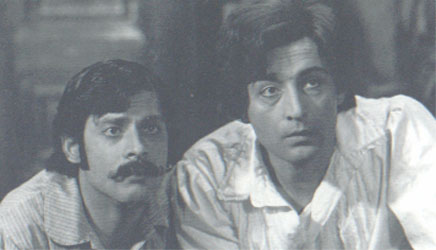
Zítra ráno vstanu a opařím se čajem (1977)
(Tomorrow In the Morning I'll Wake Up And Scald Myself With Tea)
Direction: Jindřich Polák. Screenplay: Miloš Macourek, Josef Nesvadba. Based on the novel of Josef Nesvadba. Starring: Petr Kostka (Jan Bureš/Karel Bureš-twins), Jiří Sovák (Klaus Abard), Vladimír Menšík (Rolf Kraus), Vlastimil Brodský (Bauer), Otto Šimánek, Marie Rosůlková (American tourists), Valerie Chmelová (Helena), Slávka Budínová (Kroupová), Josef Větrovec (Kroupa), Zuzana Ondrouchová (Eva), František Vicena (Adolf Hitler), Petr Nárožný (the truck driver).
A close future: Jan and Karel Bureš are brothers-twins. Jan is a good, a little bit shy man, while Karel is a self-confident wrongdoer, who works as a pilot in a company specialized in the journeys into the past. One morning Karel unhappily suffocates by a roll and Jan spontaneously begins to pretend that the dead brother was him. One of the motivations is Karel's beautiful spouse Eva that was ruthlessly deceived by him, but who loved him a lot and would undoubtedly commit a suicide. But Jan has no idea about an arrangement that Karel concluded with three former Nazis, who plan to use the time machine to pass a nuclear bomb to Adolf Hitler. It seems that Jan incurred big problems and the destiny of the whole mankind lies on his shoulders. In the end everything ends happily, the Nazi gangsters are prisoned and Karel is saved from suffocating by a roll... Or is it Jan? :)))
At first I didn't intend to list this title, but I was quite surprised by positive comments on imdb.com. It is a good comedy with a very original story and a lot of very funny situations resulting from time paradoxes and mistaken identities. By the way, the American tourists asking a photograph with Adolf Hitler are really lovely! The tricks may seem quite archaic now and I wouldn't dare to compare it with the Back to the Future - as one of British reviewers on imdb.com does -, but the idea of the authors deserves attention.
Vrchní, prchni (1980)
(Run, Waiter, Run)
Direction: Ladislav Smoljak. Screenplay: Zdeněk Svěrák. Music and singing: Jaroslav Uhlíř. Starring: Josef Abrhám (Dalibor Vrána), Libuše Šafránková (Vránová), Zdeněk Svěrák and Daniela Bakerová (the Pařízeks), Eliška Balzerová (Věra), Dagmar Patrasová (Manuela), Jiří Kodet (Vyskočil), Karel Augusta (cousin Ludva), Zuzana Fišerová (Douchová).
Dalibor Vrána is a twice divorced bookseller, whose favourite hobby is to seduce beautiful women. Since he must also pay aliments, his living standard isn't too high and when he once visits a meeting of his former schoolmates, he sees the misery of his life. However, once a drunked guest in a restaurant mistakenly regards him as a waiter and Vrána finds a solution of his joyless situation: to dress himself as a waiter and cash money from guests in restaurants. He has big success and money fall, but I don't have to say that it is a dangerous job with a lot of risks...
Josef Abrhám (in a disguise) as the "phantom of restaurants"
The movie was allegedly based on a true story. Vrchní, prchni is an excellent comedy, one of the best ones that Svěrák & Smoljak have ever made (in my opinion it is their best). Josef Abrhám proved excellent comic talent. The movie also got an award of the critique and an award for the best screenplay at a humouristic film festival in France. The music of Jaroslav Uhlíř is also worth note.
Postřižiny (1980)
(The Short Cut)
Direction: Jiří Menzel. Screenplay: Bohumil Hrabal, Jiří Menzel. Based on a novel by Bohumil Hrabal. Music: Jiří Šust. Starring: Magda Vašáryová (Maryška), Jiří Schmitzer (Francin), Jaromír Hanzlík (Pepin), Rudolf Hrušínský sen. (dr. Gruntorád), Petr Čepek (de Giorgi), Oldřich Vlach (Růžička), František Řehák (Vejvoda), Miloslav Štibich (Bernádek), Rudolf Hrušínský jr. (the stable boy), Pavel Vondruška (Lustig), Alois Liškutín (Štefl), Oldřich Vízner (Červinka), Miroslav Donutil (the houseman), Zdeněk Podskalský (the vicar).
Francin, a trustee of a brewery in a little town in the beginning of the twenties lives with his beautiful long-haired wife Maryška, who is a center of attention of all men around. His happy days end when his brother, unbelievable windbag Pepin, comes to the brewery to visit them for 14 days (or 40 years?). Subsequently we watch Pepin's terrible influence on the life in the brewery, his escapades with Maryška and unsuccessful courting of dr. Gruntorád, who eventually ends almost got rid of his nose. Since we are in the twenties and technological advancement shortens distances, Maryška can't remain away and the new age demands shortening her beautiful hair.
A legendary title of Jiří Menzel with unforgettable scenes and performances (and enchanting Magda Vašáryová, who showed more of her grace than only her head). It was based on a novel of Bohumil Hrabal, who actually depicted a part of his childhood that he spent with his parents in a brewery in a little Moravian town. His uncle Pepin really came to stay for 14 days, but eventually stayed for 40 years. Unfortunately, Pepin's Hanakian dialect can't be translated, so I think that foreigners can't enjoy this movie in its full beauty. A note: If you will be watching carefully, you can glimpse young Miroslav Donutil in a "mute" role of a foppish housekeeper.

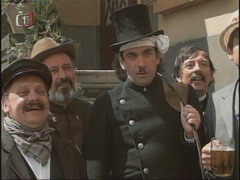
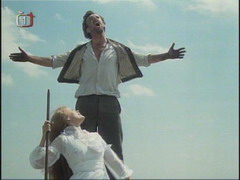
Photographs taken from http://www.meteleskublesku.cz/?movie=19
Jak svět přichází o básníky (1982)
(How the World Loses Poets)
Direction: Dušan Klein. Screenplay: Dušan Klein after a novel by Ladislav Pecháček. Music: Zdeněk Marat. Lyrics of songs: Vladimír Poštulka. Starring: Pavel Kříž (Štěpán), David Matásek (Kendy), Miroslava Šafránková (Borůvka), František Filipovský (Valerián), Josef Somr (professor Ječmen), Jiří Císler (Čermáček), Oldřich Navrátil (Nádeníček), Lenka Kořínková (Vránová), František Čech (Bouchal), Míla Myslíková (Štěpán's mother), Barbora Štěpánová (Hrdličková).
Štěpán Šafránek is a high school student, who composes verses (especially for girls). His friend Kendy has musical and film ambitions. Together they prepare a theatrical performance, into which they incorporate a lot of citizens of their little town. Moreover, Štěpán loves sweet girl nicknamed Borůvka, who is hovered around by engineer Nádeníček.
Dušan Klein (*1939) was originally a director of average criminal stories. In 1982 he changed genre and tried to create a movie about (and for) young people. His attempt was exceptionally successful; this title began a so-called "poetic trilogy", in which the director described further adventures of his heroes - Jak básníci přicházejí o iluze (How Poets Lose Their Illusions, 1984) and Jak básníkům chutná život (How Poets Enjoy Life, 1987). Here Štěpán became a young doctor and his friend Kendy studied direction at the conservatoire in Prague. These movies helped Pavel Kříž to become an idol of young girls. However, in 1988 he emmigrated to Canada. After his return director Klein again casted him in the fourth part called Konec básníků v Čechách (The End of Poets in Bohemia, 1994), but not so successfully like before. Recently Klein made the fifth part (so it's a pentalogy now) called Jak básníci neztrácejí naději (How Poets Don't Lose Hope, 2005).
A note: It was the last movie of Miroslava Šafránková, sister of Libuše Šafránková, until 1994, when she appeared in the second series of Arabela. She allegedly married a foreigner and emmigrated to the West.
Slunce, seno, jahody (1983)
(Sun, Hay, and Strawberries)
Direction: Zdeněk Troška. Screenplay: Zdeněk Troška, Petr Markov. Music: Karel Vágner. Lyrics of songs: Pavel Žák, Jan Krůta. Starring: Helena Růžičková and Stanislav Tříska (the Hošek family), Pavel Kikinčuk (Šimon), Broněk Černý (Venca), Veronika Kánská (Blažena), Petra Pyšová (Miluna), Marie Švecová (Keliška), Erna Červená (the grandmother), Miroslav Zounar (the chief of the cooperative), Jiří Lábus (Béďa), Luděk Kopřiva (the parson), Jaroslava Kretschmerová (Evička), Jiřina Jirásková (Hubičková).
All Czech intellectuals would probably stone me to death that I list this title, but it is an inseparable part of the Czech cinema. Director Zdeněk Troška invented a "plebeian" comedy situated into his native village Hoštice in south Bohemia and casted with a mix of actors and non-actors. The latter ones primarily consist of the inhabitants of Hoštice and even of the members of Troška's family. The comedy relates about the life of the Hošek family and especially about the love affairs of their pretty daughter. We also watch a scientific attempt of young student Šimon, who tries to raise the milk yield of cows in the agricultural cooperative by installing music into cowhouses and eventually for each cow specially.
This brutally realistic satire on the village life was a phenomenal blockbuster in Czech theatres in mid 80's (3,35 million visitors in total) and in 1989 Troška made the second part Slunce, seno a pár facek (Sun, Hay, and A Few Facers), which was even more successful (more than 4 million spectators, including me). These two movies made him the most successful director of the eighties. In 1991 he adapted himself to the demands of the new age and made an "erotic version" called Slunce, Seno, Erotika (Sun, Hay, and Erotics). However, the third part is an essence of stupid vulgarity and proved that Troška doesn't know limits of good taste. One reviever on Czech film pages commented it fittingly as "a movie, where a post-revolution ecstasy from the widening of possibilities (here erotics) wins over common sense and screenplay".
A note: The part of Mrs. Hošek is the most known role of Helena Růžičková, who soon became something like a symbol of the trilogy (Well, her body is enough to overshadow all other actors). There is also a lot of other legendary bizarre figures, like the village gossips around parson Otík, the ghost in a mill, the venomous granny in a mobile bed, or Mrs. Hubičková, who is able to forecast weather after the colour of her voice.
Vesničko má, středisková (1985)
(My Sweet Village)
Direction: Jiří Menzel. Screenplay: Zdeněk Svěrák. Music: Jiří Šust. Starring: János Bán (Otík), Marian Labuda (Pávek), Rudolf Hrušínský sen. (dr. Skružný), Petr Čepek (Turek), Libuše Šafránková (Jana), Jan Hartl (Kašpar), Miroslav Štibich (Kalina), Oldřich Vlach (Kunc), Stanislav Aubrecht (Kája), Zdeněk Svěrák (Ryba), Marie Šebestová (Věra), Július Satinský (Štefan), Josef Somr (the director), František Vláčil (Ticháček), Milena Dvorská (Pávková), Rudolf Hrušínský jr. (Drápalík).
Driver Pávek has a mentally retarded helper, young Otík, who once causes an accident and Pávek decides to get rid of him. Otík is then sent to work in Prague, but he is unhappy and wants to return back to his beloved Pávek. Simultaneously, we watch infidelity of Mrs. Turková, who wants to obtain Otík's house, where she could subsequently commit a sinny junction with her paramour Mr. Kašpar. However, the movie has a happy end and Otík eventually returns back.
According to some sources from the middle of the nineties, this movie was comercially the most successful title in the history of the Czech cinematography (however, I suppose that Kolya was later better). It was sold to many foreign countries including the United States. You can also read very positive commentaries on www.imdb.com or www.amazon.com. On the other hand, personally I don't like it much. I remember that when I saw it for the first time (on video), I was totally disappointed. I think that director Menzel has much better movies, especially Postřižiny (The Short Cut, 1980) and a story about a village idiot isn't the right title that should represent Czech cinematography in the world. There are very good moments, but as a whole, it is not exceptionally entertaining (at least for me).
Obecná škola (1991)
(The Elementary School)
Direction: Jan Svěrák. Screenplay: Zdeněk Svěrák. Music: Jiří Svoboda + compositions of Antonín Dvořák and Jiří Traxler. Starring: Jan Tříska (Igor Hnízdo), Zdeněk Svěrák (Souček), Libuše Šafránková (Součková), Rudolf Hrušínský sen. (the director), Václav Jakoubek (Eda), Radoslav Budáč (Tonda), Marek Endal (Rosenheim), Daniela Kolářová (Maxová), Irena Pavlásková and Ondřej Vetchý (the Pavláseks), Eva Holubová and Rudolf Hrušínský jr. (the Čejkas), Petr Čepek (Rádži Tamil).
1945: Two friends live their childhood in a frontier village. They visit an elementary school full of scamps, who eventually get their teacher Mrs. Maxová into a mental home. Mrs. Maxová is substituted by very strict teacher Mr. Hnízdo, a former soldier, who establishes severe discipline. But Hnízdo also has a human side and he will attract the attention of children by adventureous stories from the time of his service in the army. In the end it also turns out that strongly potent Hnízdo has a weakness that caused a withdrawal from the former place of his working. Nevertheless, his boys stand by him.
A very successful debut of Jan Svěrák, son of Zdeněk Svěrák. Obecná škola is a very pleasant movie with cheerful moments, although it may seem too slow and little "action" to some people. Jan Svěrák already had a student's Oscar for his ecologic parody Ropáci and this time he was "only" nominated for the same award.
Dědictví aneb Kurvahošigutntag (1993)
(The Inheritance or Fuckoffguysgoodbye)
Direction: Věra Chytilová. Screenplay: Věra Chytilová, Biolek Polívka. Music: Jiří Bulis. Starring: Boleslav Polívka (Bohuš), Miroslav Donutil (lawyer Ulrich), Dagmar Veškrnová (Vlasta), Šárka Vojtková (Irena), Anna Pantůčková (aunt), Pavel Zatloukal (Lojza), Břetislav Rychlík (Francek), Pavel Brichta (Jura), Jozef Króner (Košťál), Arnošt Goldflam (Arnošt), Ivana Chýlková (Mrs. Ulrich/Ulrichová).
Bohuš is a simpleminded Moravian villager, who lives in a small dilapidated house. His life flows on a spiral "work in the wood - local pub" - until he is visited by lawyer Ulrich, who informs him that due to post-communistic restitutions he inherited big property once belonging to his dead father. Bohuš is shocked and is not able to handle with it properly. Gradually he spends almost all his money and ends as poor man... or doesn't he?
Eventually I decided to list this popular "folk" comedy, although I really don't regard it as any masterpiece of Czech cinematography. Director Chytilová, who left the world of artistic phantasmagories, revealed her average craftmanship, especially bad dramaturgy. As one reviewer on imdb.com remarked, "Dedictvi aneb Kurvahosigutentag is a number of one man show sequences that are put together in a hasty and sloppy way." Furthermore, the movie contains all typical features of the early 90's post-communist era (especially a visit of an erotic saloon). However, this all is largely counterbalanced by good gags and funny dialogues. Thanks to them, the movie is very entertaining, although a certain level of folk vulgarity makes it unrecommendable for more snobbish spectators. It is interesting that at the time of its creation, the title was badly received by film critics, but gradually it has somewhat "ripened" and won big popularity among TV spectators. Now it runs on TV almost every year. Several scenes with half-naked Dagmar Veškrnová in the role of an innkeeper are worth watching, considering that in 1997 she became our "First Lady".
Kolja (1996)
(Kolya)
Direction: Jan Svěrák. Screenplay: Zdeněk Svěrák. Music: Ondřej Soukup + compositions of Antonín Dvořák and Bedřich Smetana. Starring: Zdeněk Svěrák (František Louka), Kolja (Andrej Chalimon), Libuše Šafránková (Klára), Ondřej Vetchý and Nella Boudová (the Brož family), Stella Zázvorková (the mother), Ladislav Smoljak (Houdek), Irina Livanovová (Naděžda), Sylvia Šuvadovová (Blanka), Karel Heřmánek (Musil), Jiří Sovák (Růžička).
I think I doesn't have to explain the story of this movie that is quite well known abroad. Little Russian boy Kolya is left by his mother, who had at first married old Czech musician Louka to get Czech citizenship and then emmigrated to the West. Louka must now take care of him, which is not easy, because he can't speak Russian and Kolja can't speak Czech.
Kolja, an Oscar winner, is a highly overstimated movie, which by far isn't only my opinion. There is a lot of excellent movies written by Zdeněk Svěrák (and made by other Czech film-workers) that are unknown abroad, and it is paradoxical that the biggest success won Kolja, an effective tear-impelling spectacle. It is understandable, however, that the creators were looking for a theme that could attract the attention of foreign audience. If the boy was Polish or Hungarian, US Academy wouldn't care. So at least from this perspective, Kolya was a clear strike home.
Pelíšky (1999)
(Cosy Dens)
Direction: Jan Hřebejk. Screenplay: Petr Jarchovský. Based on a novel of Petr Šabach Hovno hoří. Starring: Miroslav Donutil (Father Šebek), Jiří Kodet (Father Kraus), Simona Stašová (Mother Šebková), Emília Vašáryová (Mother Krausová), Bolek Polívka (Uncle Šebek), Eva Holubová (the teacher), Marek Morvai (Petr), Stella Zázvorková (the grandmother Šebková), Jaroslav Dušek (Saša Maslan), Michael Beran (Michal), Jiří Krejčík (dr. Stárek), Kristýna Nováková (Jindřiška), Sylvie Koblížková (Uzlinka).
Miroslav Donutil as Father Šebek
Instead of inventing my own review, I use commentaries from www.imdb.com: It is a most entertaining black comedy from start to finish. Jan Hřebejk takes us back to the months preceding the ill-fated Prague Spring of 1968. The setting is ideal for a political drama, but Czech artists prefer to make a comedy with political background. The action takes place in a house, where families from different political camps, Sebkovi and Krausovi (pro-communist vs. anti-communist), live together. They are celebrating Christmas, but not everyone is in a good mood. Teenage kids think their fathers are totaly stupid. Basically, it contains the classic story line - boy loves girl, boy loses girl to the best friend, but with the added advantage of her staying lost.
Pelíšky is one of those rare post-1989 movies that markedly overcame my expectations. It is really a very good comedy with a little bit tragic admixture. Furthermore, after a nightmarish decade of cinematographic horrors, it brought a big relief to more than 1 million Czechs, who could finally enjoy a good movie of domestic provenance. (The big expectations didn't come true, however; later years showed that speaking about a miraculous resurrection of Czech cinema would be too hasty.)
One year later director Hřebejk filmed a tragicomedy Musíme si pomáhat (We must help each other; official English title: Divided We Fall, 2000) about a man, who shelters a Jewish boy and because he doesn't want to be suspected, he is forced to pretend that he is a Nazi quisling. In my opinion, this movie doesn't reach the quality of Pelíšky, although Hřebejk used the same actors (Dušek, Polívka). I had mixed feelings from it, because it is neither a drama, nor a comedy. Unfortunately, despite Hřebejk's diligence in the film industry (or just because of it?), his later works had a clearly declining quality, and his recent movies fell to the grey average of the Czech film production.
Rebelové (2001)
(The Rebels)
Zuzana Norisová (*1979), originally a girl from a Slovakian town Malacky, came to Prague to realize her "Czech dream". At first she probably took an example by Madonna and earned money as a waitress.
Direction: Filip Renč. Screenplay: Filip Renč and Petr Zelenka. Starring: Zuzana Norisová (Tereza), Anna Veselá (Julča), Alžběta Stanková (Bugyna), Jan Révai (Šimon), Lubo Kostelný (Ivan), Jaromír Nosek (Bob), Martin Kubačák (Olda), Ondřej Šípek (Tuřín), Petr Burian (Drmola), Tomáš Hanák (Tereza's father), František Němec (the parson), Jiřina Bohdalová (the chairwoman of the committee).
A little town near the Czech-German border, summer 1968: Three youngsters, Šimon, Ivan and Bob, have deserted from the army and want to flee to the West. They find a shelter at a parson, who is Šimon's uncle, and pretend that they are workers renovating his church. In the meantime, they prepare for the flight in a traffic train that regularly goes through the town and then across the border. However, they also meet three girls, who fall in love with them. In the centre of our attention there is a love of Šimon and Tereza, who is annoyed by love proposals of Olda, a son of a communistic boss. In the very end, Šimon decides to stay and doesn't follow his friends, because his love to Tereza is stronger than his lasting for freedom. However, he doesn't know that in the meantime the occupational armies crossed the Czechoslovakian border and Tereza with her father decided to emmigrate. So while Tereza is crossing the border and hopes that she will meet him soon again, Šimon is arrested after his return to the town.
Director Filip Renč, once a child star, hasn't made too many movies so far. However, his first movie, Requiem pro panenku/The Requiem For A Puppet 1991, was very well accepted and was the first title role of Anna Geislerová, the future star of Czech cinema. The next years he mostly devoted to making TV advertisement and videoclips (and was very successful). After a drama Válka barev (The War Of Colours) that was a clear failure, he began to prepare a film musical from the sixties, which was a very happy era of the Czech pop. As he once said, it lasted 7 years until his dreams came true. Just like Pelíšky, Rebelové are one of those rare Czech movies after 1989 that overcame my expectations. Although the story isn't too sophisticated, the movie has three big qualities: 1) a very interesting visual look, 2) a lot of beautiful songs (including Neckář's Stín katedrál and Czech remakes of Western hits) - and 3) the youthful grace of formerly unknown Zuzana Norisová, who appeared like a meteor from nowhere and subsequently became one of the most popular young singers and actresses in the country. By the way, when recently Čadík brothers travelled across Eastern Europe with their road theatre and showed the most remarkable Czech movies made after 1989, Rebelové got the biggest applause from the audience.
Pátá ("Down Town")
A coversion of Petr Novák's great hit from 60's "I'll be Walking On Tiptoe"
...and, of course, Šu-Šu-Šu
...and even more from REBELOVÉ on
Snowboarďáci (2004)
(Snowboarders?)
Director: Karel Janák. Screenplay: Karel Janák. Music: Miroslav Chýška. Starring: Vojtěch Kotek (Rendy), Jiří Mádl (Jáchym), Ester Geislerová (Marta), Jiří Langmajer (cousin Milan), Lucie Vondráčková (Klára), Barbora Seidlová (Tereza), Martina Klírová (Lucie), Michal Novotný (the German skier), Otakar Brousek (Rendy's father), Veronika Freimanová (Rendy's mother).
The biggest movie hit of Czech provenience of 2005... or how "American Pie" -like films began to conquer Czech republic. Director Karel Janák (*1970) excelled primarily like an author of TV advertisement (or, better said, promos to movies shown on TV), for which he got several European awards (e. g. the best European promo 2002 and 2004). His film debut Snowboarďáci (how to translate it... Snowboarders or Snowboard-boys?) was clearly inspired by the current boom of teenager's comedies, where young boys (or girls) uneasasily discover the world of love (or sex, respectively). Two young boys from Prague, Rendy and Jáchym, have the same troubles. Besides that, they love snowboarding and they excel in it, but, sincerely said, only on a computer simulator in a Prague's game room. After Rendy gets a Christmas present - a new snowboard - , they both decide to go to mountains and "hunt" some girls. They hope that they will find a very cheap accomadation at the chalet of Jáchym's cousin Milan, but Milan gives them nothing for free and they must serve like cleaners of the whole house. Soon they also learn that their theoretic knowledge of snowboarding is for nothing and it seems that they have no chance to make impression on three attractive girls, who are accomodated there. Furthermore, the fate is so cruel to them that they must share the chalet with Jáchym's ironical sister Marta, not speaking about an old man-eater, who would want to get them into her room. And the wave of mutual spites starts...
It is interesting that when this movie entered Czech movie houses, one critic wrote that "no promised wonder happened". Yet within several weeks, the film became the biggest Czech film hit of the year and won almost a cultic status. The performers of title roles, Vojtěch (Vojta) Kotek and Jiří Madl, obviously a well-chosen duo with excellent comic talent, also won incredible popularity and encouraged the director to the preparation of another similar movies. In spring 2006 we thus got a "summer version" called Rafťáci (The Raft-Boys) and another title followed in 2006 (R(o)ck podvraťáků/The Ro©k Con Artists).
Personally I think that a realistic rating of Snowboarďáci is as difficult as in many other "American Pie"-movies. Many people don't like it, but one can't say that it wouldn't be entertaining and funny. It contains one excretive scene that I was quite disgusted from (although I must also confess that I couldn't stop laughing), but otherwise the movie doesn't seem bad to me. For sure, Kotek + Mádl is a comic duo with great future.
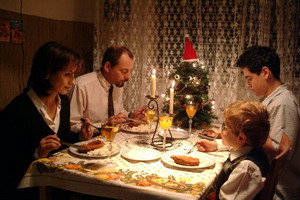
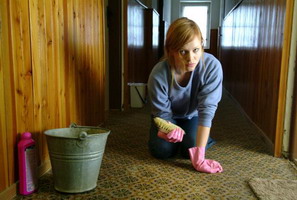
Official page: http://www.whisconti.cz/snowboardaci/
The title song (sung by Dan Bárta): http://www.whisconti.cz/snowboardaci/music/on_my_head.mp3
TRAILER
Obsluhoval jsem anglického krále (2006)
(I Served the King of England)Director: Jiří Menzel. Screenplay: Jiří Menzel (on the grounds of Bohumil Hrabal's novel). Music: Aleš Březina. Starring: Ivan Barnev (Jan Dítě-young), Oldřich Kaiser (Jan Dítě-old), Julia Jentsch (Líza), Martin Huba (Skřivánek), Marián Labuda (Walden), Milan Lasica (professor), Josef Abrhám (hotelier Brandejs), Jaromír Dulava (waiter Karel), Jiří Lábus (hotel boss).
A much awaited adaptation of Bohumil Hrabal's novel about a pushing waiter of a small stature, who eventually makes it to the top of his profession - and has even the opportunity to serve the king of England...
A title to which I have nothing to say, because I had not any opportunity to see it yet.
Vratné láhve (2007)
(Empties)
Director: Jan Svěrák. Screenplay: Zdeněk Svěrák. Music: Ondřej Soukup. Starring: Zdeněk Svěrák (Josef Tkaloun), Daniela Kolářová (Mrs Tkalounová), Tatiana Vilhelmová (daughter), Martin Pechlát (her former husband Karel), Jan Budař (Úlisný), Jiří Macháček (deputy headmaster Landa), Alena Vránová (headmaster), Miroslav Táborský (Šubrt), Nella Boudová (teacher Ptáčková), Jan Vlasák (Wasserbauer), Ondřej Vetchý (Řezáč jr.).
Since the "success" of a somewhat sauceless war drama Tmavomodrý svět (The Dark Blue World, 2001), there has been a rumour that Zdeněk Svěrák writes a new comedy about an aging man, who is looking for new life impulses as a clerk responsible for storing empty bottles in a Prague supermarket. The making of this project was not easy, because the director-son Jan Svěrák was not satisfied with the screenplay and it must have been repeatedly rewritten. This already suggested that the quality of "Empties" wouldn't be comparable to Svěrák's former works and frankly, from such a theme I really didn't expect much. But when this movie was aired on TV for the first time and I saw the last 30 minutes, I was utterly disappointed and I thought that this flick was Zdeněk Svěrák's swan song. Fortunately, later I watched the complete footage and this time I had to correct my original opinion. Nevertheless...
What's the matter here? Old teacher Tkaloun (performed by Zdeněk Svěrák) is disgusted from the increasing impudence of his pupils and decides to leave his job. After several pieces of bad experience (and an almost fatal bike accident, when he works as a "blitz post deliverer", he takes a job in a local supermarket, where he works as a clerk buying out empty bottles. Here he meets another loser, young colleague Úlisný, who is constantly planning to study at the university (although not right now, but "sometimes in the future"). Tkaloun's life misery is further exacerbated by conflicts with his similarly aging wife and problems of his daughter, who was abandoned by her husband. At the same time, Tkaloun can't resist erotic temptations by young women-visitors of the supermarket... Will the story of his unhappy family lead to a happy end?
Despite some witty dialogues and funny moments, and despite panegyrics of many bootlickers, "Empties" is undoubtedly the worst movie written by Zdeněk Svěrák and directed by his son. This doesn't mean that it is bad. However, the presented story is quite trivial and boring, and I suspect that not all spectators may succeed in keeping their eyes open to the very end. Since Zdeněk Svěrák's name still remains as one of those few in the Czech film business, who guarantee some solid entertainment, "Empties" attracted nearly 1-million spectators to Czech theatres. However, personally I think that if both Svěráks continue in the ingoing trend, they will soon follow the fate of their colleague Jan Hřebejk, the fallen author of Pelíšky.
Although I don't want to do an injustice to the current Czech comedy production, there is no doubt that it is not comparable with the "golden era" of 60's and 70's. Young directors mostly make comedy attempts that look somewhat deviantly (I don't know, if it has anything to do with the frequent drug consumption) and are entirely aimed at young public. A case for itself is the production of director Zdeněk Troška. The success of his cheap, folk comedies tells something about the current level of Czech comedy genre.
